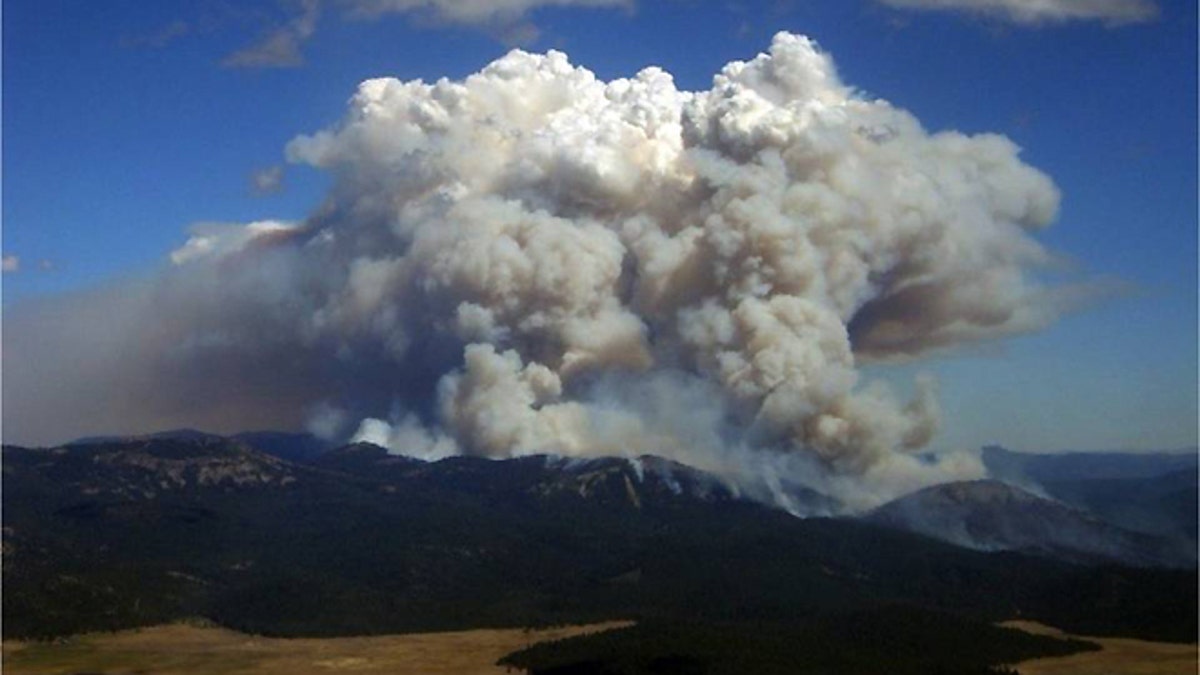
Smoke rises from the Moonlight fire, which burned in Plumas and Lassen counties in California for 22 days in September 2007. (Office of U.S. attorney)
Question: What happens when lawyers uncover what could be explosive evidence of misconduct in a $122 million case by attorneys in the Department of Justice? Answer: the Department of Justice tries to have all defense lawyers who have even read about the alleged government misconduct removed from the case and gagged from discussing what they know.
What’s at stake here? In a word, justice, including the ability of many lawyers to continue to represent their clients. And it is ultimately about our justice system—about the very rule of law.
This is not a hypothetical issue. It happened last month in a California federal court, where a local timber company is trying to pursue charges of fraud against federal prosecutors and investigators as well as win back millions in imposed penalties. The company has already won a major victory in California’s state court—which may be why the Department of Justice is trying so hard to make this case of allegedly profound prosecutorial abuse vanish.
[pullquote]
The story starts on Labor Day weekend 2007, near Westwood, California, where a wildfire destroyed 65,000 acres of countryside. Some 45,000 of those acres were national forest, and it cost millions for state and federal governments to extinguish the blaze. State and federal investigators and prosecutors set about to identify the cause and find someone to blame.
They quickly focused on a “deep pocket”—Sierra Pacific, a family-owned company that is the country’s second largest timber supplier and a huge local land-owner.
The government agencies decided that a bulldozer used by Sierra Pacific created a spark that started the blaze, and a massive litigation assault forced Sierra Pacific to sign a settlement of cash and land valued at $122 million to end the federal litigation alone against it. Sierra Pacific has already paid millions toward the settlement and transferred 1,500 acres of its valuable land to the feds.
But when push came to shove on a parallel state court case brought against Sierra Pacific by Cal Fire, the California investigative authority, it was the civil prosecution that went up in smoke. A state audit lead to the discovery of piles of evidence that Cal Fire had hidden concerning the case--including an unauthorized, off-the-books “slush fund” that Cal Fire maintained for the profits of such actions.
California Judge Leslie C. Nichols found that Cal Fire “had engaged in the pervasive and systematic abuse of the California discovery rules” and “egregious” conduct affecting the integrity of the court itself.
He assessed $32 million in fees and court expenses against the state. Although the U.S. government was not a party to the state case, the U.S. Forest Service, Cal Fire and their attorneys had all worked together on the investigation and litigation under a joint prosecution agreement.
More was soon to come. Former Assistant U.S, Attorney E. Robert Wright read the widely publicized orders of Judge Nichols, and on June 12, 2014 gave Sierra Pacific’s defense a 15-page sworn statement for use in the federal case against the timber firm. In it, he raised serious questions about possible suppression of evidence that would clear the company.
Sierra Pacific has now asked a federal court to set aside its $122 million settlement agreement because of fraud on the court—by the federal prosecutors and agents. A federal judge has the case, and held his first hearing on its status on November 24. California Senior Federal District Judge William Shubb, himself a former U.S. Attorney, is reputedly a no-nonsense jurist who expects the government to follow the law—a novel and welcome application of Article III of our Constitution.
Shockingly, the Department of Justice moved to disqualify all of the defense attorneys who even read Robert Wright’s sworn declaration. The government asked the court to remove the entire defense team because Wright’s declaration contains confidential and privileged information belonging to the government.
The Department also claims that former Assistant United States Attorney Wright breached his duties of loyalty and confidentiality to his former client, the United States, by disclosing that the government may have been hiding evidence that undermined its case. Calling Wright’s duty of loyalty to his client “absolute,” and his breach “inexcusable,” they claim that he should have brought any concern to the attention of his superiors.
Unfortunately for the government counsel, Assistant U.S. Attorney David Shelledy, Sierra Pacific’s motion to set aside the judgment states that it did bring the entire problem to the Justice Department’s Office of Professional Responsibility—only to have the evidence of misconduct smothered as effectively as the evidence that someone less wealthy than Sierra Pacific had caused the original fire.
So far, Judge Shubb is not impressed. He’s ignoring the Department’s motion to disqualify all the defense attorneys, and instead, requested more briefing on the real issues of government misconduct and possible fraud on the court.
A 1935 Supreme Court decision entitled Berger v. United States enshrines the notion that U.S. Attorneys are representatives “not of an ordinary party to a controversy, but of a sovereignty” whose interest is not “that it shall win a case, but that justice shall be done.”
If so, perhaps Assistant U.S. Attorney Shelledy will wind up disqualified. Specifically named in Wright’s affidavit and implicated in possibly improper ethical decisions, he has a glaring conflict of interest. Why is he still involved in pleadings for the United States?
Fraud on the court infects our entire judicial system and renders public confidence impossible. What happens in Judge Shubb’s Sacramento federal courtroom will matter to all Americans.








































